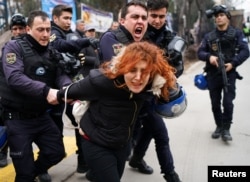“No End in Sight” is the title of the British-based Amnesty International report into the ongoing crackdown in Turkey, after last July’s failed coup.
The 21-page report focuses on what it describes as the arbitrary dismissals of more than 100,000 public service workers, since the introduction of emergency rule after a botched military takeover.
“People are losing not only their jobs, but also their professional careers are destroyed; their family lives are destroyed; this is a disastrous situation facing a vast number of people,” warns Andrew Gardner, Amnesty’s Turkey researcher, “and there appears no end in sight.”
The Amnesty report says mass firings cover all fields of public service, including the armed forces, police, teachers, doctors and academics, as well as people working across all ministries and local government.
The report was compiled from interviews of human rights lawyers, local NGOs, trade unions and those who’ve been dismissed. It claims that those fired are provided with only “generalized justification” and no specific evidence against them. All dismissals are done by presidential decrees using emergency powers.
Ankara claims the crackdown is necessary due to the unprecedented threat posed by the coup attempt, in which more than 200 people died. Followers of the U.S. based Islamic cleric Fethullah Gulen are blamed, with the government arguing that many have infiltrated all parts of the Turkish state, and continue to pose a threat.
The Amnesty report acknowledges the severity of the July coup, and says all those involved should be brought to justice. But it claims the investigation through 33 interviews of those fired indicates no evidence of any connection to the coup, and that the crackdown is more about silencing criticism.
‘Legitimate peaceful criticism’
“From people that Amnesty has interviewed, there is very strong evidence that these people were targeted not because of their violent opposition to the government, but for their legitimate peaceful criticism of the ruling AK Party government,” said Gardner.
The report cited an interview with a Ministry of Justice official, who gave the example of a dismissal because the person cancelled a subscription to a digital TV provider, after Gulen supporters called for a boycott of the provider.
Amnesty said the crackdown has targeted many academics who signed a petition calling for an end to the conflict against the Kurdish rebel group, the PKK. Despite government denials that it's targeting those petitioners, Amnesty says more than one-third of those who signed the petition have been dismissed.
Lack of redress of those dismissed is a key point in the report.
“Currently, no courts in Turkey have accepted jurisdiction to review the dismissals,” the report wrote. Last week the government announcement a seven-man panel (all those on the panel are men), for those seeking redress, a move that has drawn derision.
“Even if this seven-person commission took hundreds of decisions a day it would not get through all the likely appeals in the two years it has been set up for. So the effectiveness of this panel and its independence is deeply in question,” says Amnesty’s Gardner.
The impact on the families of those dismissed also was mentioned, with a series of case studies explaining the economic and social hardship endured. Those who are sacked are banned from seeking any work in other state sectors, while opportunities also are limited in the private sector.
“Due to the stigma of being branded ‘terrorists’ under the decrees, many have not been able to find any work at all,” said the report. “People can't function in society anymore,” points out Gardner. "Many highly qualified people have ended up in menial jobs like cleaning, and with no hope of redress.”
The door has been closed to those seeking work abroad, with Amnesty saying the passports of many of those fired have been seized by authorities - a move that has prevented many academics taking job offers abroad. Several organizations assisting persecuted academics have provided scores of job offers to Turkish academics.
The emergency rule period is scheduled to end July 17, but hopes of any letup in the ongoing crackdown were dashed by President Recep Tayyip Erdogan. Speaking Sunday on being elected as head of his ruling AK Party, he declared that emergency rule will continue indefinitely.
“It will not be removed. Until when? Until we reach peace and prosperity,” declared Erdogan.
The Amnesty report concludes “that the dismissals and associated measures threaten a broad range of human rights protected by international conventions to which Turkey is a party. The report says a legitimate means of redress must be created.





